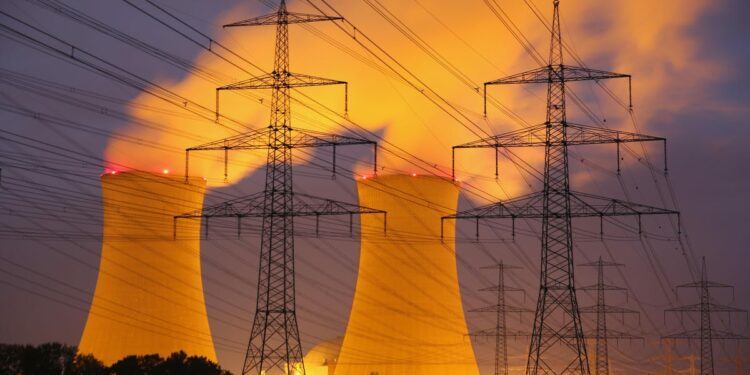A new European Union (EU) proposal to treat new nuclear power and natural gas investments as “green” is sparking controversy over the taxonomy of sustainable energy, provoking a clash between Paris and Berlin. On Sunday, the German government slammed the European Commission’s attempt to classify nuclear investments as climate friendly, despite their reliability and emissions-free power generation. Curiously, the German government signaled that it was, on the other hand, open to the labeling of certain natural gas projects as sustainable, despite the carbon dioxide and methane emissions inherent in the burning of natural gas. Springtime for Gazprom and Russia, in Germany, to paraphrase The Producers.
Just days ago, Germany shuttered half of its six still operational nuclear power plants as part of its pledge to eliminate all nuclear power by 2022. Another quizzical move given its failure to meet Merkel-era climate pledges.
The German Environment Minister Steffi Lemke (The Greens) sharply criticized the proposal arguing that because nuclear energy can lead to environmental disasters and leave behind large quantities of spent fuel, it “cannot be sustainable.” While the Greens have led the offense against nuclear power, the government led by the Social Democratic Party (SPD), with the Greens and the Free Democratic Party (FDP) as its coalition partners, embraced natural gas.
This proposal follows a year-long battle among members states to determine which investments are environmentally friendly. The EU has set out to create a labeling system to define which economic activities are sustainable. This regulatory steamroller is intended to make climate-friendly investments more attractive to private capital firms, preventing “greenwashing,” which happens when companies and government entities overstate their environmental credentials to acquire lucrative contracts and tax incentives.
The labeling of nuclear power has long been controversial within the EU government. Alongside Germany, Austria and Luxembourg also oppose classifying the nuclear power reactors as sustainable alongside wind and solar. France, which derives 70% of its power from home-generated nuclear power, is an obvious proponent of the new energy classification. Other nuclear consumers like Finland and the Czech Republic support the French position and see it as crucial to phase out coal-fired plants. Germany, a preeminent EU decision-maker, is now on a collision course with pro-nuclear France. The political disagreements between France and Germany are nothing new. This iteration of the historic feud has become vital to understanding the debate over nuclear energy.
The plan presented over the weekend in Brussels attempts to strike a middle ground between conflicting interests in moving toward nuclear power. The proposal will classify natural gas and nuclear power as transitional green energy sources as an incentive to move countries away from coal and carbon-emitting power.
Regulatory agencies will deem nuclear power a sustainable energy source if countries enable safe and environmentally sound ways to dispose of radioactive waste. This is a primary concern for the German government, looking to avoid energy disasters like those at Fukushima and Chernobyl.
A central component of the EU proposal would only consider such nuclear power plants meeting these specifications as “green” until 2045, after which they would undergo safety upgrades to ensure protection standards are met. This safeguard is also set to ease German concerns.
Yet cutting-edge nuclear disposal techniques should put critics at ease. When processed, spent nuclear fuel from power plants still has a 95% potential to produce electricity. Highly efficient fast breeder reactors offer potential solutions for waste management as they are designed to use spent nuclear waste as fuel.
Considering the EU’s proposal to include natural gas as a bridge toward renewable energy and nuclear power, one must consider that Russia, together with Qatar and Norway, remains the leading exporter of natural gas and nuclear reactors to Europe. This proposal will undoubtedly serve as a win for the Kremlin as it prepares to pump 55 billion cubic meters of natural gas a year through the just-completed Nord Stream II pipeline to Germany.
While natural gas emits only half of the carbon emission of coal, it can be called a “transition” fuel but not “green,” which assumes zero carbon emissions. Yet, the recent months demonstrated that Germany and Europe’s mad dash to renewables without proper solutions in energy storage and smart grids could cause an economic and humanitarian crisis. Hence the policy change and new business opportunities for nuclear and gas sectors.
Yet, national security needs to be considered, especially given the war fears over Ukraine and the “Putin Ultimatum”. While nuclear power and natural gas are necessary for bridging the gap between fossil fuels and renewable energy – and deserve the policy and fiscal benefits afforded by a “green” classification – care should be taken to prevent yet more Russian influence in the EU’s energy sector. This could include strict limitations on Russian energy imports, financing, and technology (holding them to the highest environmental and safety standards), increased liquified natural gas purchases from American energy exporters such as Cheniere and Tellurian, and joint EU/NATO sanctions coordination should the Kremlin act aggressively in Ukraine or elsewhere.
This depends on a French and German middle ground, however. May the cooler heads prevail.
With assistance from Riley Moeder and Sarah Shinton











